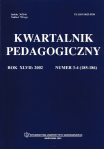Filozoficzna kategoria totalności jako heurystyka pseudopedagogiczności
The philosofical category as a heuriistic of pseudo-pedagogy
Author(s): Jarosław GaraSubject(s): Education
Published by: Wydawnictwa Uniwersytetu Warszawskiego
Keywords: philosophy of the dialogue; philosophy of education; intersubjective relationship; pseudo-pedagogic.
Summary/Abstract: Totality deprives the human life of individuality. Both Franz Rosenzweig and Emmanuel Lévinas sought the sources of totalitarian thinking in the philosophical tradition of the West that is based on Greek ontology. Its most important issue may be expressed in the question about arche panton and the answers to the inquiries of this kind have always led some individual existences to one superior whole, thus neutralizing their own unique identity. The philosophical category of totality is therefore something more than an intellectual abuse because it is also reflected in both social and cultural life. Moreover, totality is always reflected in the fact that it wants to grasp, subordinate and unite everything in one vastly superior whole. That is why one can differentiate two sorts of totality – the “hard” one (connected with some hidden forms of violence) and the “soft” one (connected with some direct acts of violence). As the most typical manifestations of the latter there should be mentioned arrogance and patronizing treatment. They constitute a specific temptation in the relationships formed in education such as the ones between the student and the teacher. These attitudes are undoubtedly related to one’s subjective feeling of superiority and to the objective being in power over others. Being arrogant and patronizing can most of all be revealed in two types of relationships, such as the one between the teacher and student as well as the one between the teacher’s superior and the teacher himself.
Journal: Kwartalnik Pedagogiczny
- Issue Year: 215/2009
- Issue No: 1
- Page Range: 31-58
- Page Count: 19
- Language: Polish
- Content File-PDF

